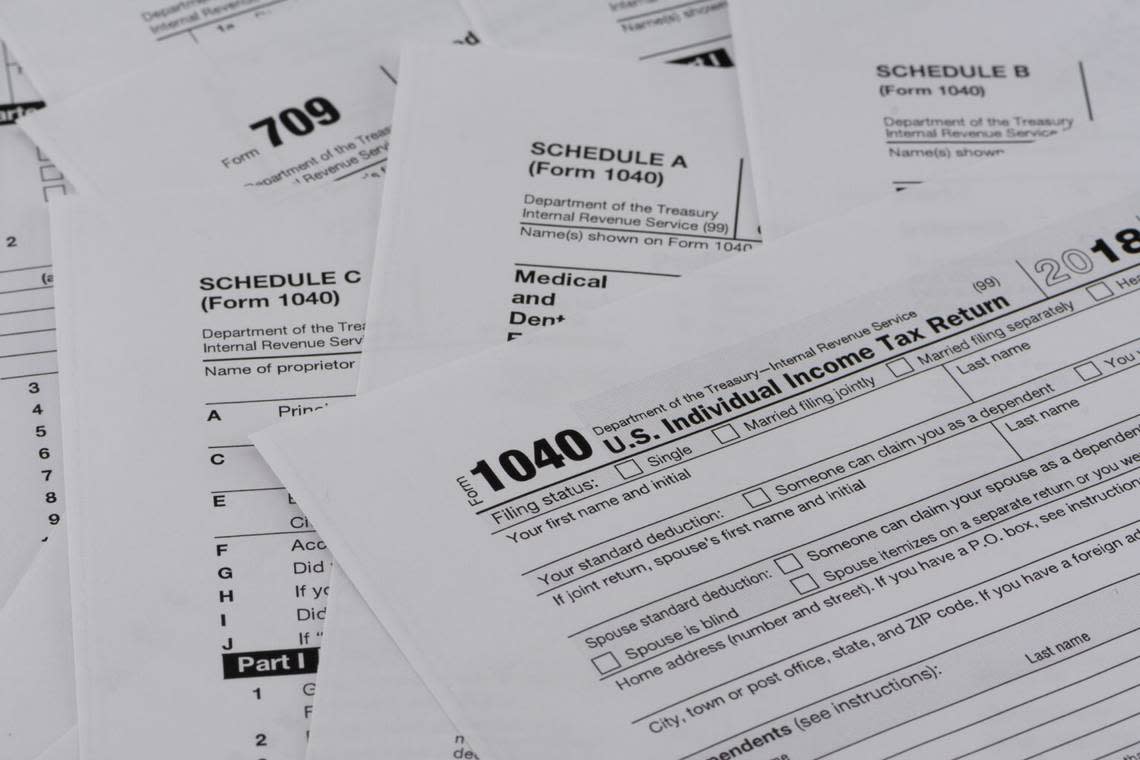Beware of bogus emails and suspicious refunds as California tax deadline lingers

If an email regarding your taxes seems suspicious, don’t open it.
Scammers get more active near tax deadlines. As California’s extension lingers, make sure that charity is in fact a charity.
Don’t think you can avoid taxes if you keep your money offshore.
These and other possible schemes are part of the “Dirty Dozen” most common scams contained in this year’s IRS warning list.
Unsolicited texts and emails are a problem that tax “practitioners deal with on a day-to-day basis,” said Lee Reams, chief technical officer for TaxBuzz and CountingWorks Inc., a Newport Beach-based company that provides services for tax professionals.
The Internal Revenue Service initiates most contacts through regular mail. The agency advises it “will never initiate contact with taxpayers by email, text or social media regarding a bill or tax refund.”
Yet “these scammers know that practitioners have the personal data on hundreds of clients on their computers,” Reams said, so tax experts constantly get emails trying to trick them into divulging the password and access to those files. Or they try to hack their way in to file fake tax returns with large refunds.
Employers beware
A major headache for tax professionals among the dozen involves the federal employee retention credit, said Tom O’Saben, director of tax content and government relations for the National Association of Tax Professionals.
The credit was aimed at encouraging employers to keep employees on their payrolls. Such employers could qualify if they were fully or partly closed because of the COVID-19 pandemic, or their gross receipts fell below a certain level, at some point from March 2020 to the end of December 2021.
“Several practitioners have reported their clients have gotten caught up in these scams and have had to amend returns to undo them since their clients don’t qualify,” Reams said.
The IRS warns that taxpayers should be aware of “aggressive pitches from scammers who promote large refunds” related to the credit, using “blatant attempts by promoters to con ineligible people to claim the credit.”
The scammers will broadcast radio and internet ads promoting refunds involving the credit, IRS says, but the agency added, “these promotions can be based on inaccurate information related to eligibility for and computation of the credit ... some of these advertisements exist solely to collect the taxpayer’s personally identifiable information in exchange for false promises.”
Though most of the country’s taxpayers, and some in California, had to file their returns last week, the deadline for people in most California counties was extended until Oct. 16 because of weather-related disasters.
The IRS’ scam list
Here are the other scam warnings from the IRS:
▪ Online “help.” “Swindlers pose as a ‘helpful’ third party and offer to help create a taxpayer’s IRS Online Account at IRS.gov. In reality, no help is needed,” the agency says. Anyone wishing to establish an online account should go to IRS.gov to set it up.
▪ Phony fuel tax credit claims. This credit is designed to provide a break off-road business and farming vehicles and is not available to most taxpayers. IRS warns scammers are “enticing taxpayers to inflate their refunds by erroneously claiming the credit.”
▪ Phony charities. This is an ongoing problem, particularly when a natural disaster such as the storms that struck California are involved.
“Scammers set up these fake organizations to take advantage of the public’s generosity. They seek money and personal information, which can be used to further exploit victims through identity theft,” IRS says.
Charitable deductions only qualify if they’re made to a tax-exempt organization recognized by the IRS. You can check on IRS.gov.
▪ Unscrupulous tax preparers. While most are honest and helpful, IRS advises watching for “common warning signs, including charging a fee based on the size of the refund. A major red flag or bad sign is when the tax preparer is unwilling to sign the dotted line.”
They’re required to include their IRS Preparer Tax Identification Number as required by law. If not, beware. And, IRS says, “taxpayers should never sign a blank or incomplete return.”
▪ Social media concerns. Such problems can involve schemes that urge people to submit false, inaccurate information to the IRS that will supposedly trigger a refund.
▪ Spearphishing. The IRS is particularly concerned about spearphishing, a way of targeting a business or organization to get information, “because there is greater potential for harm if the tax preparer has a data breach. A successful spearphishing attack can ultimately steal client data and the tax preparer’s identity, allowing the thief to file fraudulent returns.”
▪ Offers in compromise. Offers in compromise is a program to aid people who are unable to settle tax debts. “But ‘mills’ can aggressively promote Offers in Compromise in misleading ways to people who clearly don’t meet the qualifications, frequently costing taxpayers thousands of dollars,” says the IRS. To see if you do qualify, click on this link.
▪ Schemes targeting high income earners. IRS notes that “Charitable Remainder Trusts are irrevocable trusts that let individuals donate assets to charity and draw annual income for life or a specific period. Unfortunately, these trusts are sometimes misused by promoters, advisors and taxpayers to try to eliminate ordinary income and/or capital gain on the sale of the property.” It also lists other potential schemes.
▪ Phony ways to avoid taxes. IRS lists some complex schemes consumers should avoid, such as certain issues with some land designated for conservation.
▪ Schemes with international elements. Among them: “The IRS continues to scrutinize attempts to hide assets in offshore accounts and accounts holding digital assets, such as cryptocurrency.”
The agency says it continues to seek people who “attempt to conceal income in offshore banks, brokerage accounts, digital asset accounts and nominee entities. Asset protection professionals and unscrupulous promoters continue to lure U.S. persons into placing their assets in offshore accounts and structures saying they are out of reach of the IRS. These assertions are not true.”

